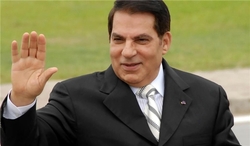 Tunisia's ousted autocrat Zine El-Abidine Ben Ali died in exile in Saudi Arabia on Thursday, days after a free presidential election in his homeland, his family lawyer said.
Tunisia's ousted autocrat Zine El-Abidine Ben Ali died in exile in Saudi Arabia on Thursday, days after a free presidential election in his homeland, his family lawyer said. RNA - "Ben Ali just died in Saudi Arabia," the lawyer, Mounir Ben Salha, told Reuters by phone.
Ben Ali fled Tunisia in January 2011 as his compatriots rose up against his oppressive rule in a revolution that inspired other Arab Spring uprisings abroad and led to a democratic transition at home.
On Sunday, Tunisians voted in an election that featured candidates from across the political spectrum, sending two political outsiders through to a second round vote unthinkable during Ben Ali's own era of power.
However, while Tunisians have enjoyed a much smoother march to democracy than citizens of the other Arab states that also rose up in 2011, many of them are economically worse off than they were under Ben Ali.
A former security chief, Ben Ali had run Tunisia for 23 years, taking power when, as prime minister in 1987, he declared president-for-life Habib Bourguiba medically unfit to rule.
In office, he sought to stifle any form of political dissent while opening up the economy, a policy that led to rapid growth but also fueled grotesque inequality and accusations of brazen corruption, not least among his own relatives.
During that era, his photograph was displayed in every shop, school, and government office from the beach resorts of the Mediterranean coast to the impoverished villages and mining towns of Tunisia's hilly interior.
On the few occasions his rule was put to the vote, he faced only nominal opposition and won re-election by more than 99%.
847/940